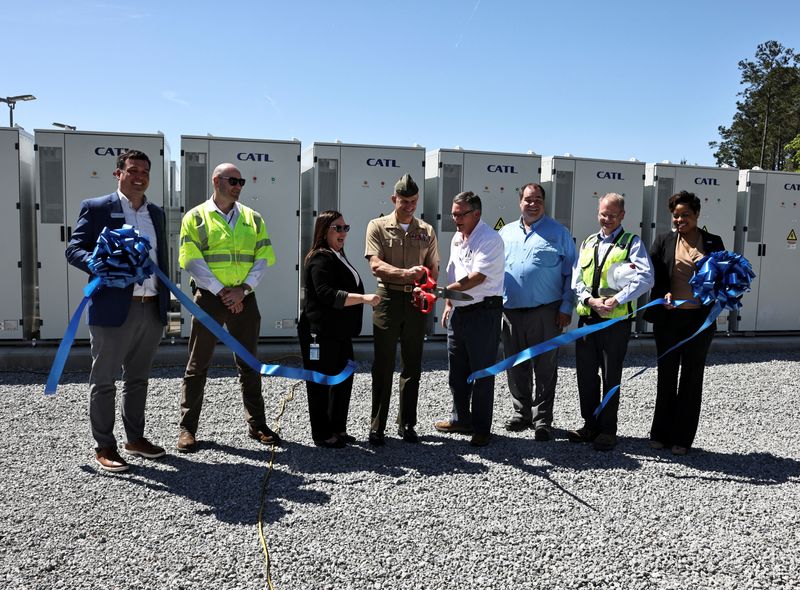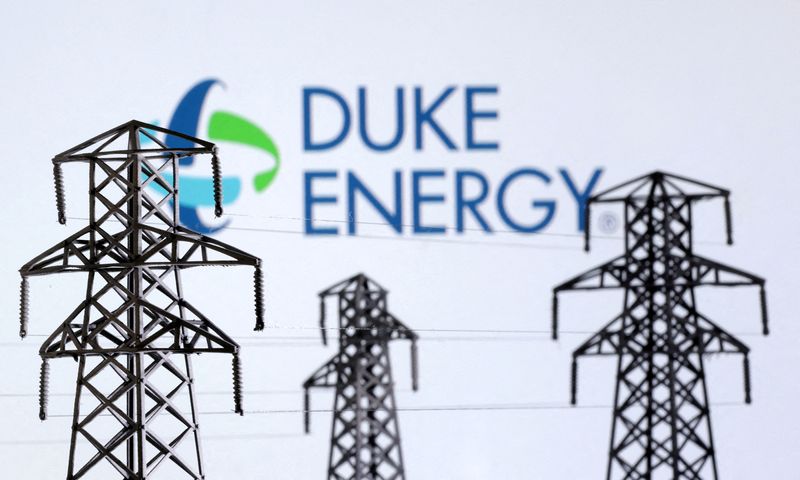By Michael Martina
WASHINGTON (Reuters) -Under pressure from Congress, U.S. utility company Duke Energy (NYSE:DUK) plans to decommission energy-storage batteries produced by Chinese battery maker CATL at one of the nation's largest Marine Corps bases and will phase out CATL products at its civilian projects, the company confirmed to Reuters.
The decision, which has not been previously reported, comes as top U.S. officials warn that hackers linked to the Chinese government are targeting network-linked critical U.S. infrastructure, including the power grid.
Reuters reported in December that Duke Energy had temporarily disconnected industrial-scale CATL storage batteries from a project on Marine Corps base Camp Lejeune after lawmakers and experts raised concerns about the battery supplier's close links to China's ruling Communist Party.
The permanent shutdown of the batteries, less than a year after a ribbon cutting that involved U.S. military brass, is the latest example of how strategic competition between the United States and China is affecting U.S. and Chinese businesses - sometimes in dramatic ways.
Duke Energy's change of course on the batteries could have supply chain implications for the utility and have a chilling effect on an energy storage market dominated by Chinese manufacturers.
"In partnership with policymakers and the Department of the Navy, we have made the decision to decommission the CATL battery energy storage system at Camp Lejeune and replace it with a domestic or allied nation supplier," Duke Energy said in a statement in response to Reuters questions.
"By 2027, we are voluntarily moving away from specifying CATL battery energy storage technologies," the statement said, adding that the company supported a "robust American supply chain."
Duke Energy had sought to assuage concerns in Congress over possible network vulnerabilities arising from the batteries, sending at least five executives, including its chief security and information officer to meet with staff of the House of Representatives' select committee on China in the first week of January, according to two sources familiar with the discussions.
While the Duke Energy executives told the staff that they were confident in the security of the batteries, they also expressed a desire to address congressional concerns, the sources said.
The executives disclosed in the meeting that the company had been considering CATL batteries for about two dozen other projects.
Duke Energy did not answer questions about how those projects would be affected by the decision to cut CATL from its supply chain. It did not specify what type of batteries it would use at the Camp Lejeune facility going forward.
One person familiar with the Camp Lejeune project said Duke Energy did not have direct contracts with CATL and bought the batteries through third party providers.
Mike Gallagher, the Republican chairman of the bipartisan select committee, and Senator Marco Rubio said in a statement to Reuters that they were pleased Duke Energy had moved to decommission the CATL batteries at Camp Lejeune.
"Additionally, in our most recent meeting with company leadership, Duke committed to entirely phasing out CATL products from its supply chain," the lawmakers said.
'SEVERELY LIMIT SUPPLY'
CATL, a global leader in energy storage, did not respond immediately to Reuters request for comment. After Duke Energy first disconnected the Camp Lejeune site, the Chinese company said its batteries had passed rigorous U.S. safety and security reviews.
The company's battery energy storage systems (BESS) are slated to be installed at commercial projects around the country, including in Texas and near Las Vegas.
Planned and operational U.S. utility-scale battery capacity reached around 16 GW at the end of 2023 and could nearly double to over 30 GW by the end of 2024, according to the U.S. Energy Information Administration.
Any broad effort to avoid Chinese batteries could put utility operators in a severe supply pinch.
"Fully avoiding Chinese batteries would severely limit supply, to the point of not being able to deploy nearly enough stationary storage systems and EVs to meet demand and decarbonization goals," said Vanessa Witte, Wood Mackenzie senior research analyst for U.S. energy storage.
Many in the industry say that Chinese batteries cells themselves do not present serious security concerns.

But communications systems on the batteries could be vulnerable to hacking, security experts say, allowing a potential adversary to trigger repeated surges and cuts in current to the electricity grid, causing cascading failure.
Over the last year, lawmakers have stepped up pressure to wean the U.S. away from Chinese batteries. A measure in this year's annual defense spending bill bans the Defense Department from procuring batteries produced by CATL and several other top Chinese manufacturers starting in 2027.
